Investigative Stories
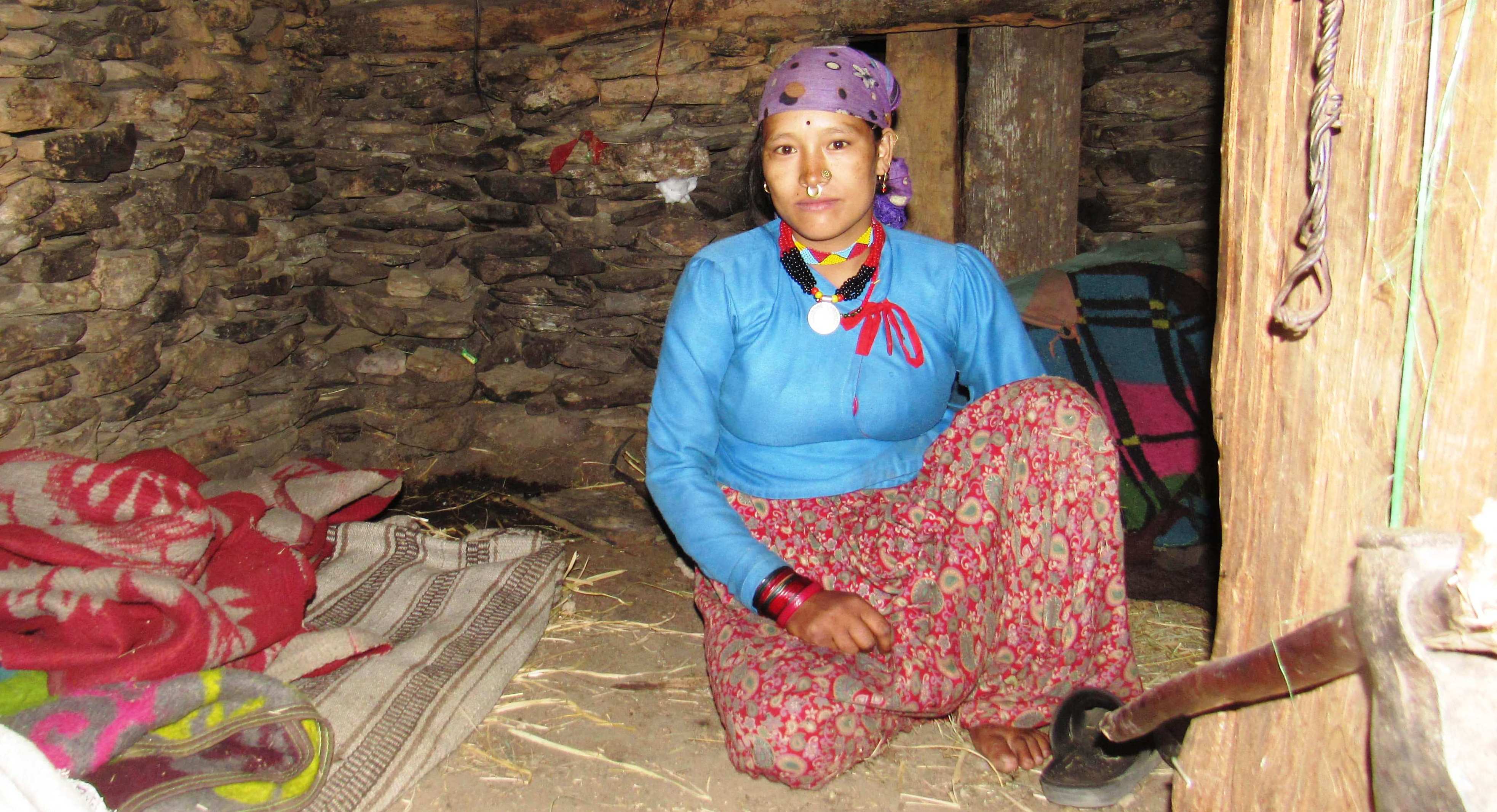
Mothers of newborns in Bajura, Humla, and Mugu endure hardships by staying in cowsheds as part of their age-old tradition despite the government's slogan of 'regular check-up', 'secured motherhood', and 'nutritious food'. A report by Mina Sharma for CIJ, after her field-reporting from these districts.
Nandasara Sarki, 23, Bajura, Baandhu
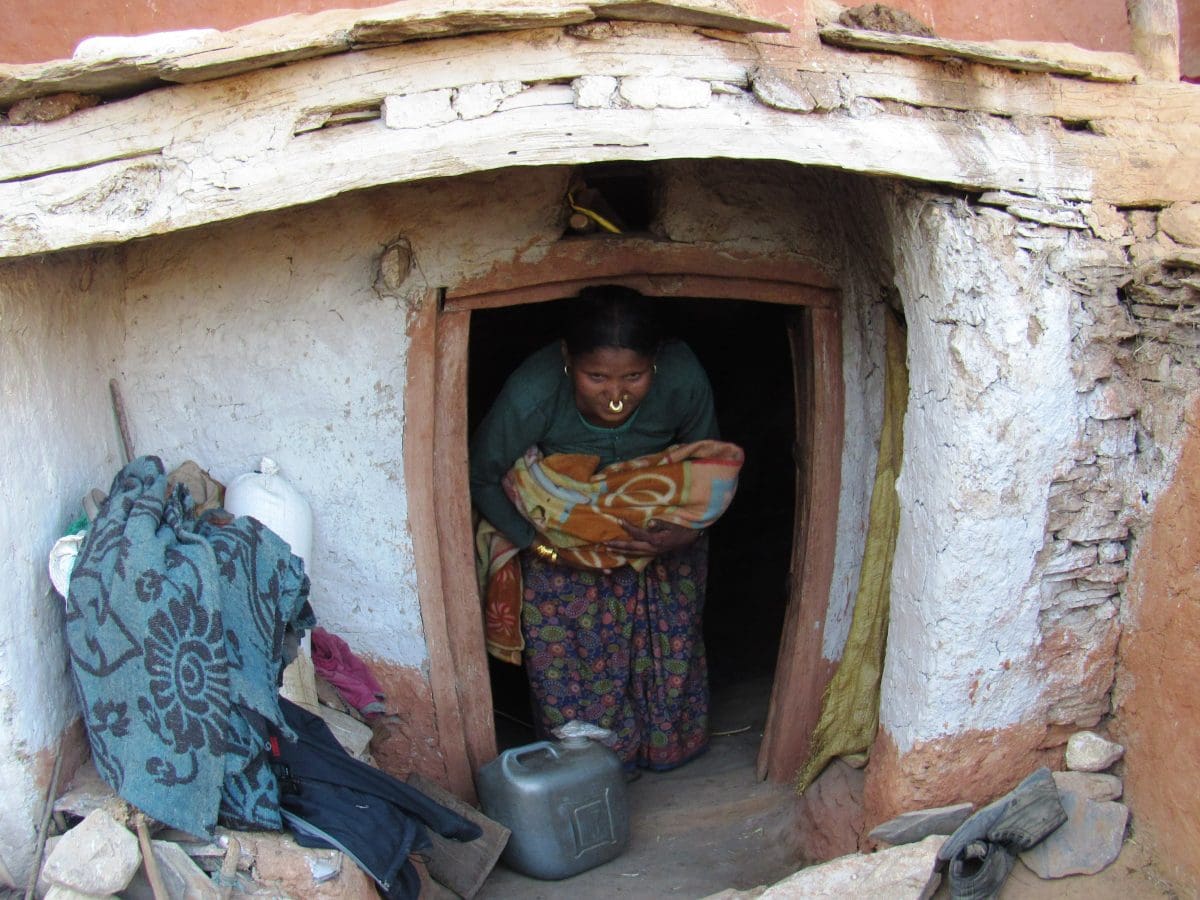 Kartik, 11, 2073. I have been staying in this shed ever since I delivered my baby 12 days ago because no one can touch us during menstruation and post-natal period. Staying in a shed has been our tradition, which most of the women here adhere to. My parent's home is in Humla where woman is sheltered in sheds during menstruation and delivery. This is my fifth baby and every time I have stayed in a cowshed for a month. Family members provide food for only 10 days after delivery. From the eleventh day, I prepare my own food.
Kartik, 11, 2073. I have been staying in this shed ever since I delivered my baby 12 days ago because no one can touch us during menstruation and post-natal period. Staying in a shed has been our tradition, which most of the women here adhere to. My parent's home is in Humla where woman is sheltered in sheds during menstruation and delivery. This is my fifth baby and every time I have stayed in a cowshed for a month. Family members provide food for only 10 days after delivery. From the eleventh day, I prepare my own food.
Two of my babies died due to cold. It's not that all new-born babies will survive. This is not only my case. This baby, too, is suffering from a cough and diarrhea. Therefore, I am sitting under the sun for warmth. The room becomes extremely cold when we do not light the fire.
Health workers often suggest us to refrain from staying in cowsheds during this period. But we do. If we stay in our homes, God will be angry and lead to disasters in our families, such as famine, drought, and other diseases. Even the babies who have survived will face consequences. I was also born in a shed and stayed there for a month. Look at me, am I not fit and fine? Therefore, there is nothing wrong in staying in sheds during this period. We should not make Gods angry for our wellbeing.
'Sir' and 'Madam' (health workers) insist us to refrain from staying in sheds. But we are absolutely fine here since we have been getting food regularly from our family members, who are nearby. Even during my next pregnancy, I will stay in a shed. I cannot go against the tradition that will lead to misfortune in my family. Is there anything wrong to tread in the footsteps of our elders, or follow the tradition? I have daughters only. I have to give birth to a son to look after the property. In fact, we cannot have a son if we do sin.
Saraswati Budathapa, 21, Bajura Rugin
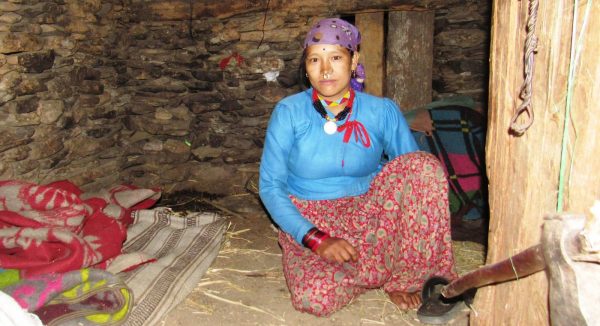 12 Kartik. I delivered my baby 12 days ago. I spent 24 hours at a health post after giving birth to this baby. Following the doctor's recommendation, we came home and ever since I have been staying in the shed. Staying in a cowshed after delivery has been a tradition in our village. We cannot make our Gods angry by entering the house or kitchen. Health workers suggest us not to stay in the shed and to maintain cleanliness but that is against our tradition. How could we break our tradition, which our mother and grandmother adhered to? When they are still safe and sound, I don't think anything will happen to me either.
12 Kartik. I delivered my baby 12 days ago. I spent 24 hours at a health post after giving birth to this baby. Following the doctor's recommendation, we came home and ever since I have been staying in the shed. Staying in a cowshed after delivery has been a tradition in our village. We cannot make our Gods angry by entering the house or kitchen. Health workers suggest us not to stay in the shed and to maintain cleanliness but that is against our tradition. How could we break our tradition, which our mother and grandmother adhered to? When they are still safe and sound, I don't think anything will happen to me either.
Can you imagine the consequences if I entered the kitchen? If deities will be angry, there will be famine and drought. Besides, our children will be disabled. How could we do this when we are aware of these consequences?
In fact, we hang an axe at the door and keep a sickle in our waist to keep away ghosts and other evils. Besides the mother and her baby, nobody will stay in the shed for a month. This is our belief and culture. In fact, we cannot follow health workers' suggestions.
Magi Chadara, 17, Mugu, Hyanglu
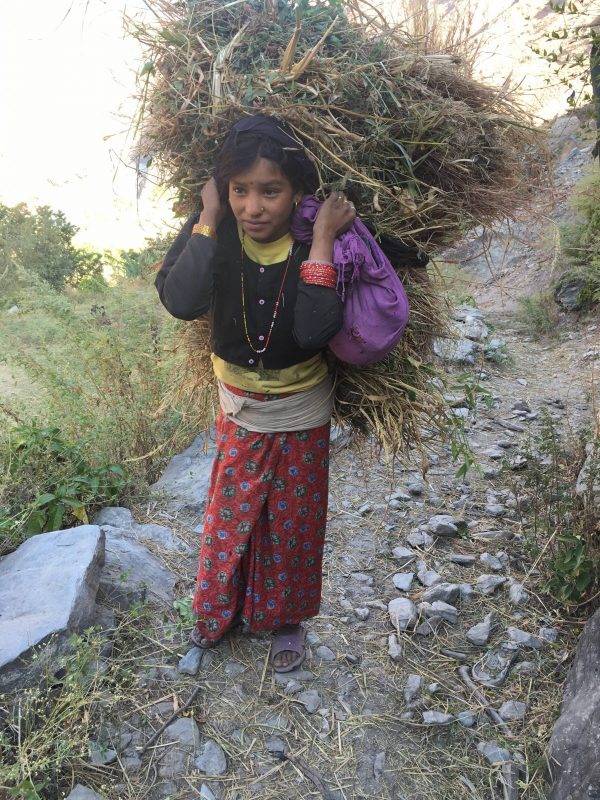 14 Kartik. My daughter is 13 days old and she is sleeping in the cowshed. I am out to cut grass for cattle. Now, after feeding the buffalo, I will eat some food, breastfeed my daughter and then come back to the field to cut grass. The health post is just a five-minute walk from here. But if I go there, they (health workers) will ask us not to stay in the shed during this period. Besides, they will call me for a regular health check-up. Therefore, I preferred to give birth in my home.
14 Kartik. My daughter is 13 days old and she is sleeping in the cowshed. I am out to cut grass for cattle. Now, after feeding the buffalo, I will eat some food, breastfeed my daughter and then come back to the field to cut grass. The health post is just a five-minute walk from here. But if I go there, they (health workers) will ask us not to stay in the shed during this period. Besides, they will call me for a regular health check-up. Therefore, I preferred to give birth in my home.
Health workers advise us not to stay in the cowshed during this period. But how could we break the age-old tradition? I rushed to the shed and gave birth to my daughter there. When my elders, including my mother, mother-in-law, sister-in-law and neighbors, gave birth to their children inside the shed why not I? Has anything happened to them? I eloped with my boyfriend at the age of 15. But, you know, life is not the same now. I have to toil hard for a living even during menstruation when we are not allowed to work indoors. Therefore, I am here to harvest paddy. Males do not touch us during menstruation. I will stay in the shed when I give birth to my second baby. How can I displease Gods by entering the kitchen? Tradition has to be followed even if I am literate. Don't you follow your tradition? God will be angry if you touch Him during menstruation. Why do people suggest us not to stay in the cowshed? How could we stay together with family members and elders in this period? Therefore, we cannot go against the practice.
Chinkala Chadara, 22, Mugu, Hyanglu
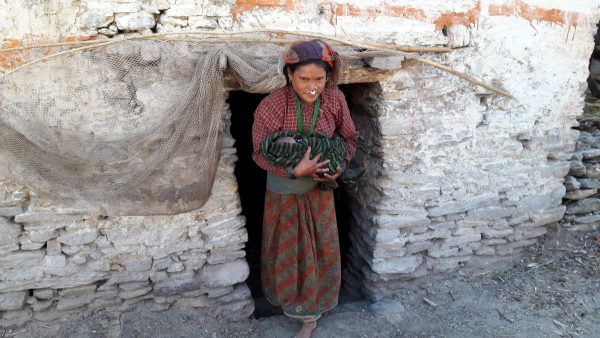 14 Kartik. I have been staying in this shed ever since I delivered my baby six days ago here. In fact, when I went to the health post during pregnancy, doctors advised me to deliver the baby at the health post. However, I gave birth to my baby in the cowshed without any complications. I was even offered some money if I delivered my baby in the health post as part of our culture. One of my neighbors, who recently delivered a baby, is also staying in a cowshed. It is our tradition to prepare food ourselves. Since nobody is allowed to touch us during menstruation, we work in the fields, wash clothes, among other chores. I find no problem in staying inside a cowshed since during this period both mother and baby are grubby. God will bestow his blessings if we please Him. If God becomes angry, there will be a crisis at home and family, especially to the male members, children will be disabled, among other problems. Staying in a cowshed for 30 days can avert untoward incidences. Therefore, what's wrong with staying here?
14 Kartik. I have been staying in this shed ever since I delivered my baby six days ago here. In fact, when I went to the health post during pregnancy, doctors advised me to deliver the baby at the health post. However, I gave birth to my baby in the cowshed without any complications. I was even offered some money if I delivered my baby in the health post as part of our culture. One of my neighbors, who recently delivered a baby, is also staying in a cowshed. It is our tradition to prepare food ourselves. Since nobody is allowed to touch us during menstruation, we work in the fields, wash clothes, among other chores. I find no problem in staying inside a cowshed since during this period both mother and baby are grubby. God will bestow his blessings if we please Him. If God becomes angry, there will be a crisis at home and family, especially to the male members, children will be disabled, among other problems. Staying in a cowshed for 30 days can avert untoward incidences. Therefore, what's wrong with staying here?
Dudhari Dhami, 24, Humla, Maila
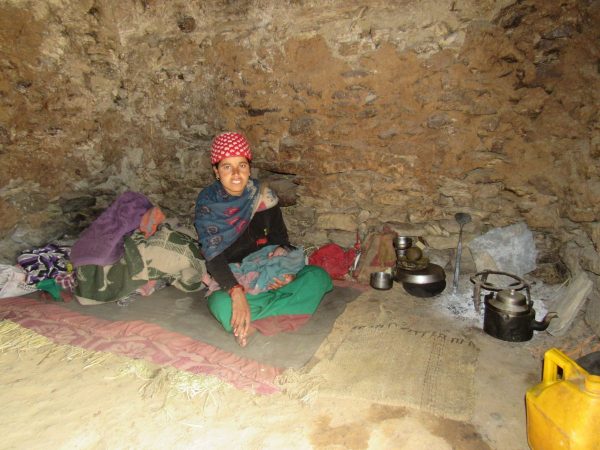 I stayed in a cowshed for a month after delivering a baby in 2072. One of my neighbors rushed me to the shed as soon as I felt pain. She cut the umbilical cord of my baby with a sickle. Even as I gave birth to two children in a cowshed, I am fit and fine. Even I was born in a cowshed. Therefore, it is wise to give birth in a shed rather than inside the house to avoid unfortunate circumstances. My mother says we have to abide by this age-old tradition. In fact, we should not drink milk during this period, and if we do so, cows or buffaloes will stop giving milk. Forget about health, tradition is important. The only problem is that insects enter the cowsheds during raining season.
I stayed in a cowshed for a month after delivering a baby in 2072. One of my neighbors rushed me to the shed as soon as I felt pain. She cut the umbilical cord of my baby with a sickle. Even as I gave birth to two children in a cowshed, I am fit and fine. Even I was born in a cowshed. Therefore, it is wise to give birth in a shed rather than inside the house to avoid unfortunate circumstances. My mother says we have to abide by this age-old tradition. In fact, we should not drink milk during this period, and if we do so, cows or buffaloes will stop giving milk. Forget about health, tradition is important. The only problem is that insects enter the cowsheds during raining season.
Bhawana Buda, 22, Humla, Maila
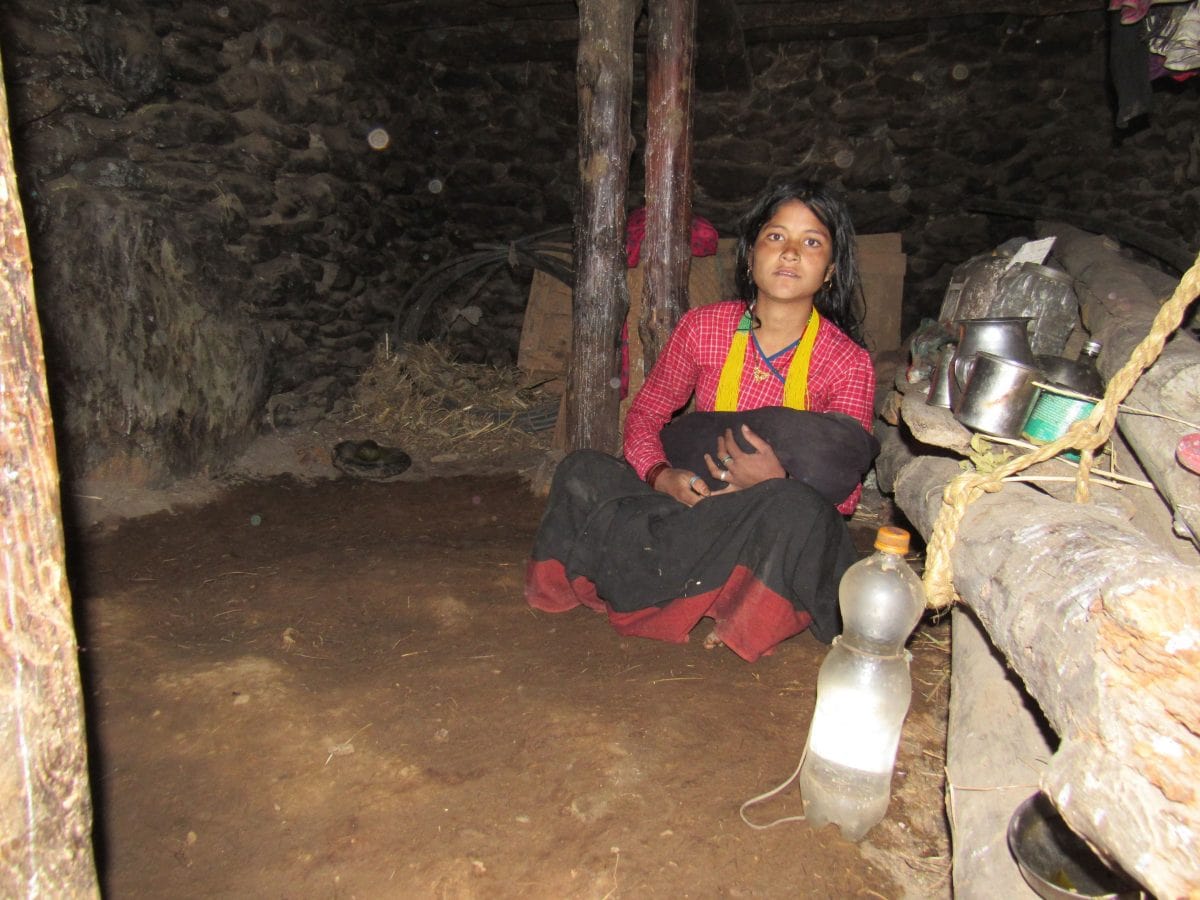 I stayed inside a cowshed after delivering three babies in 2072. Health posts are just an alternative in case of complications. Besides, since the health post is far away from here, we cannot go there by leaving domestic chores. Feeding green leaves or liquid can cause diarrhea to the babies. Hence, we need to be cautious while feeding a baby. We should prepare food ourselves. My mother says flouting the rules will make God unhappy. Therefore, we stay in cowsheds to avoid unfortunate circumstances.
I stayed inside a cowshed after delivering three babies in 2072. Health posts are just an alternative in case of complications. Besides, since the health post is far away from here, we cannot go there by leaving domestic chores. Feeding green leaves or liquid can cause diarrhea to the babies. Hence, we need to be cautious while feeding a baby. We should prepare food ourselves. My mother says flouting the rules will make God unhappy. Therefore, we stay in cowsheds to avoid unfortunate circumstances.
Ramudevi Malla, Bajura, Baandh
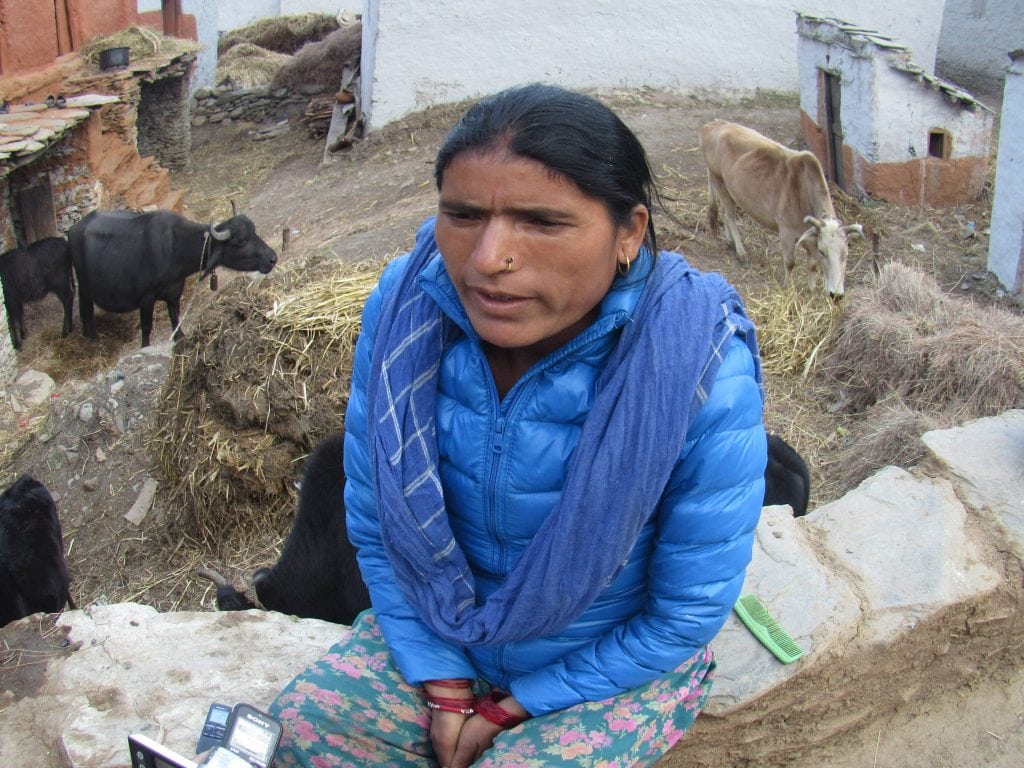 I have been working as a health worker for the last ten years. I have failed to convince people here that giving birth to a baby inside a cowshed will lead to complications. We have succeeded in making people aware of pregnancy tests, vitamins, de-worm, and iron tablets but have not been able to convince about cowsheds. There is a belief that God will be displeased if they stay in their homes during this period. An awareness campaign should be initiated to end this practice.
I have been working as a health worker for the last ten years. I have failed to convince people here that giving birth to a baby inside a cowshed will lead to complications. We have succeeded in making people aware of pregnancy tests, vitamins, de-worm, and iron tablets but have not been able to convince about cowsheds. There is a belief that God will be displeased if they stay in their homes during this period. An awareness campaign should be initiated to end this practice.
In fact, we could not even convince them in a group. Kolti is far away and has no access to television or radio. Women are rushed to the cowshed as soon as labor pain starts even if health workers are nearby. They don't even heed our words.
I delivered my baby inside my home just to convince them that no evil is going to happen, however, to no avail. I even asked them to keep the mother and baby in a separate clean room, and not in kitchen or praying room. Only one to three percent keeps mother and bay in their homes. Majority of the people here have superstitious belief.
In fact, getting rid of these beliefs is not an easy task. Daughters-in-law cannot break this tradition. They still have trust in their mothers-in-law and elders who claim to have been hale and hearty despite staying in cowsheds after delivering even 10 babies. Elderly women do not want youngsters to go to health centers. Therefore, young women, too, cannot challenge the tradition.
Earlier, there was no practice of cleaning the cowshed. However, these days, they place some hay on the floor after cleaning the shed. Most of the sheds are filthy. Forget about listening to us about cleanliness, hygiene, and diet, they will instead prefer to argue with us. Last year, a mother died of excessive bleeding due to infection on the way to the health post. Even if we tell them that staying in a cowshed will invite complications such as pneumonia, diarrhea, and other diseases, they will rather wittily respond saying, "We don't want to displease God."
Dhan Bahadur Fadera, Acting Chief, Rugin Health Post
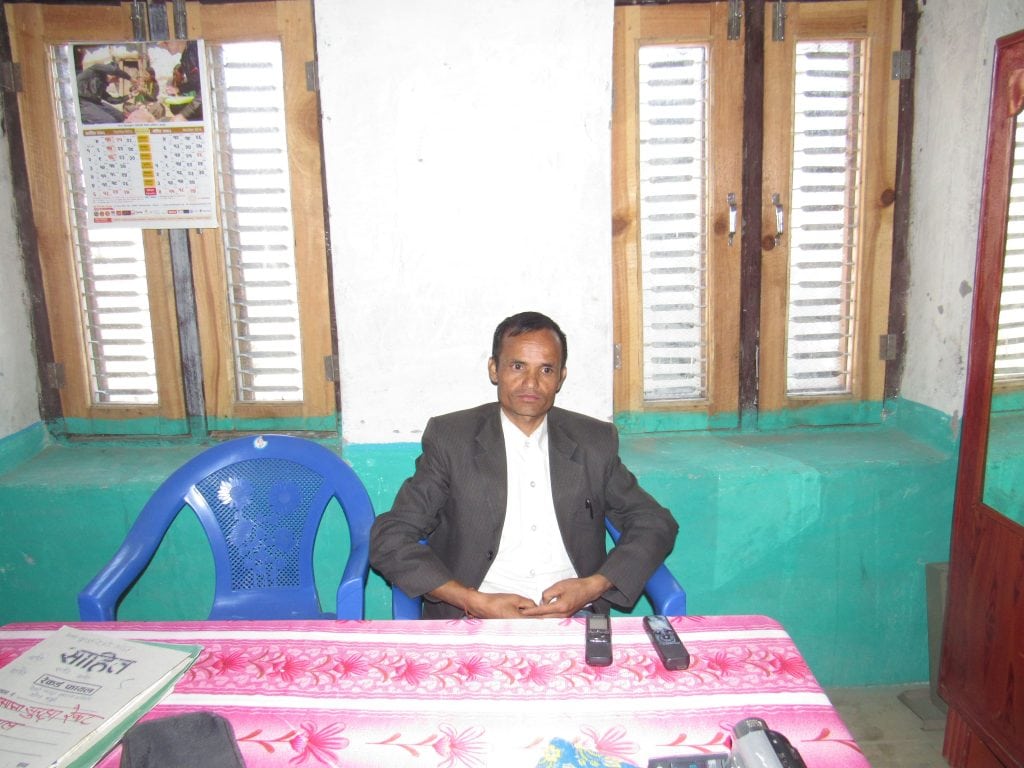 In fact, pregnancy is a sensitive issue. However, there has been a practice of keeping them inside a cowshed with the belief that God would spell curse on them if mothers of new-born babies are kept inside the house. Health-wise, their condition becomes critical with various complications. I have been here for the last two years. They come to health post only if the condition becomes critical. Sometimes, it is hard to save their lives. They are least bothered about health issues, hygiene, and pure drinking water. They prefer to stay inside narrow and filthy cowsheds. There are high chances of the new-born bay being affected by pneumonia.
In fact, pregnancy is a sensitive issue. However, there has been a practice of keeping them inside a cowshed with the belief that God would spell curse on them if mothers of new-born babies are kept inside the house. Health-wise, their condition becomes critical with various complications. I have been here for the last two years. They come to health post only if the condition becomes critical. Sometimes, it is hard to save their lives. They are least bothered about health issues, hygiene, and pure drinking water. They prefer to stay inside narrow and filthy cowsheds. There are high chances of the new-born bay being affected by pneumonia.
Despite various awareness programs, they are not going to give up their age-old practice. These mothers are neither allowed to consume dairy products such as milk, butter, and curd nor are they given meat for a month. I belong to Kalikot and have visited almost all regions of Karnali. Eighty percent of the people still keep mothers in cowsheds for a month in these areas. Even a graduate will prefer keeping his wife in a cowshed during this period. In such a situation, how could we expect change?
More Investigative Stories

Hotter Himalaya melts glaciers
Villages in Manang live directly below a glacial lake that is in danger of bursting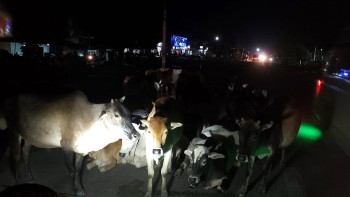
Stray cattle continue to haunt Kailali and Kanchanpur streets despite massive investment to manage them
Streets and settlements in Kailali and Kanchanpur have been teeming with stray cattle for years, destroying crops and causing road...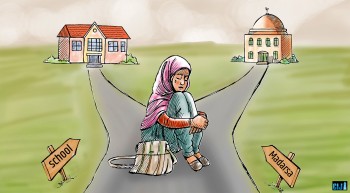

Comment Here